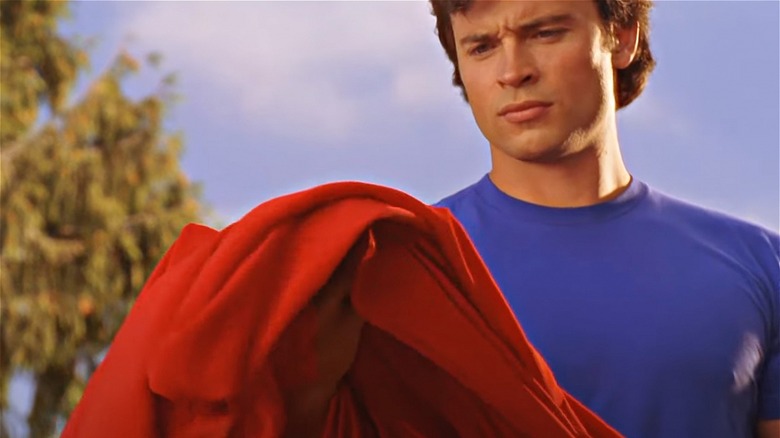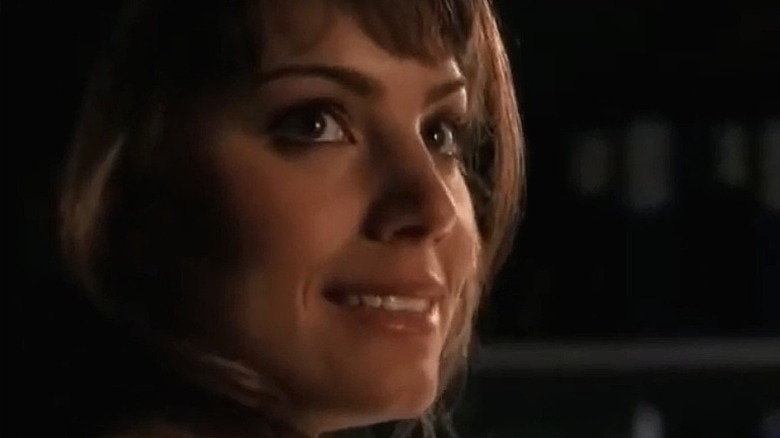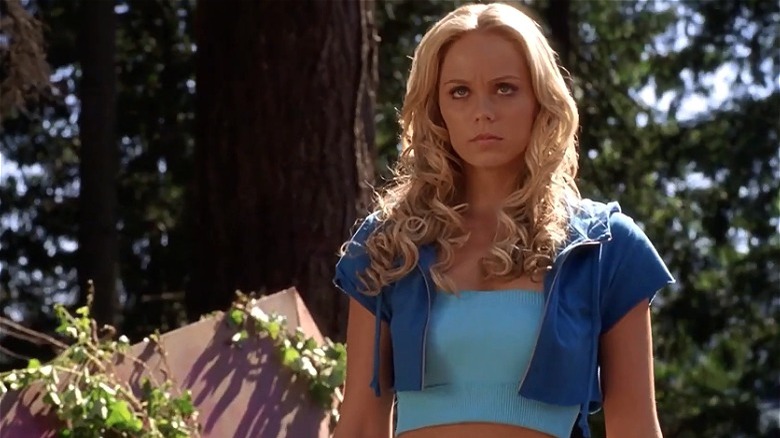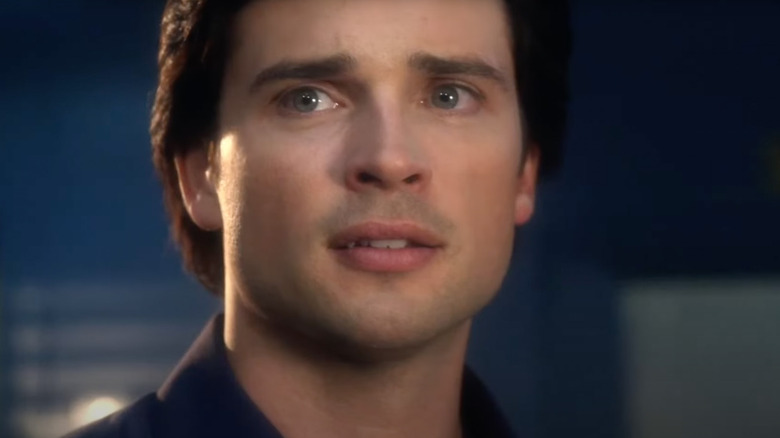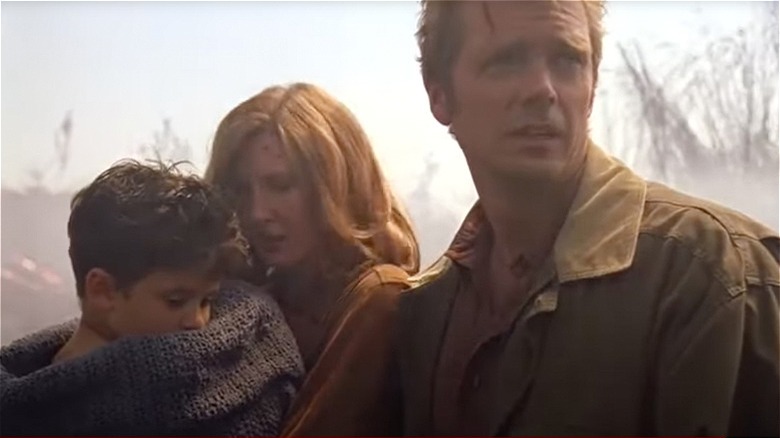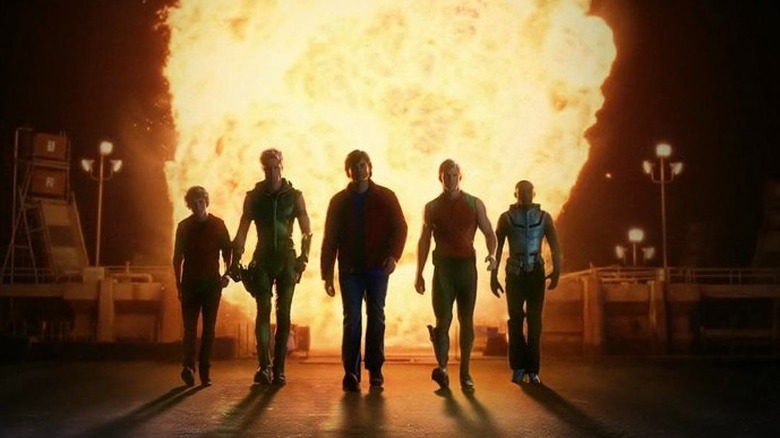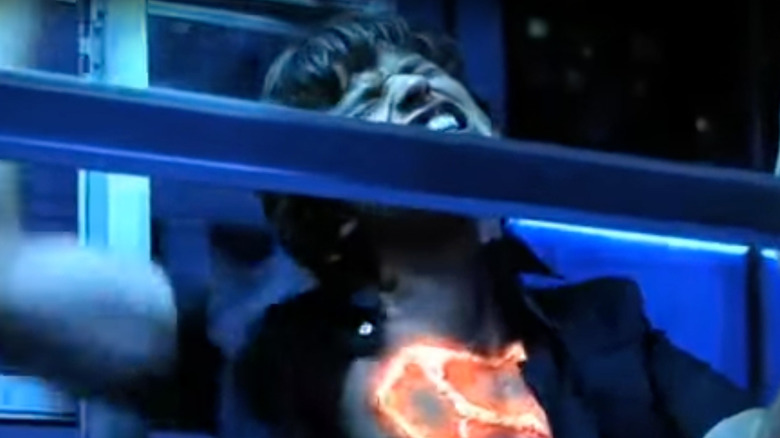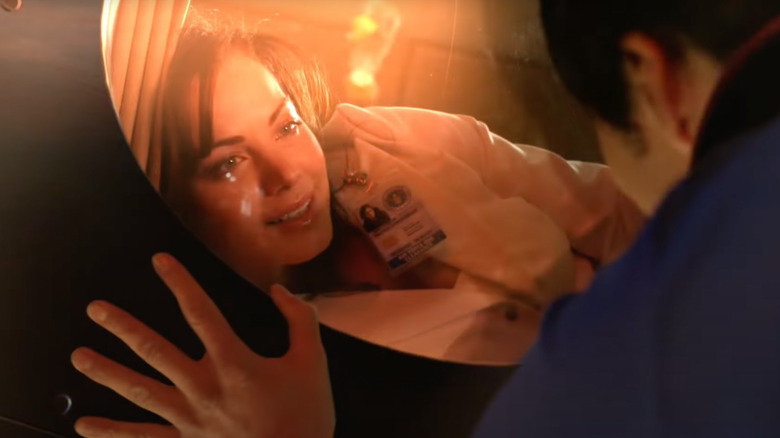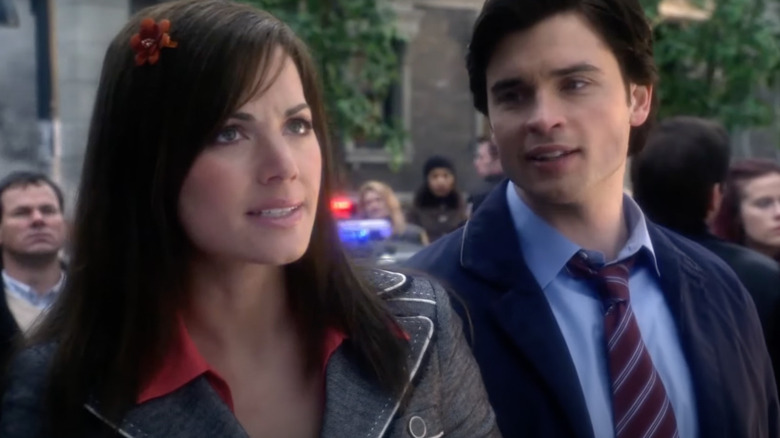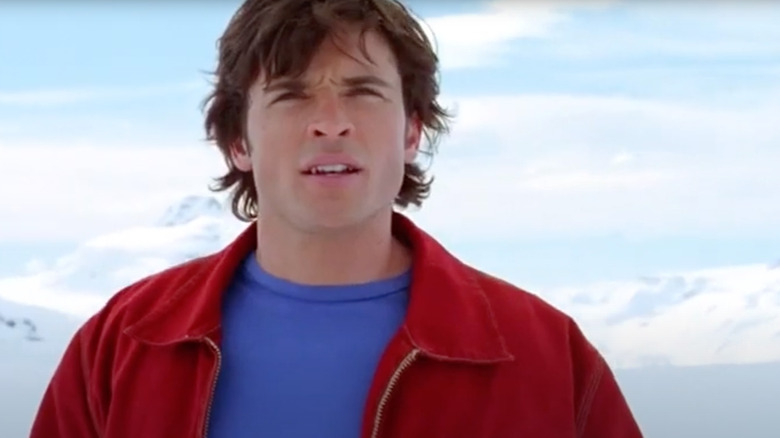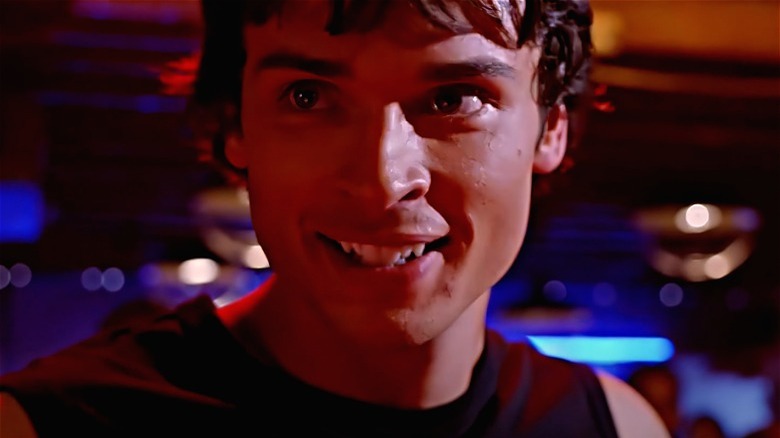Every Season Of Smallville Ranked Worst To Best
Ah, the glory days of early-2000s television, when studios scrambled to capitalize on the success of "Buffy the Vampire Slayer," "Friends," and "Beverly Hills, 90210." Enter The WB's "Smallville," a Superman prequel based on the blue boy's formative years, before he donned the tights, red underwear, and cape. Starring Tom Welling as Clark Kent, Kristin Kreuk as Lana Lane, Michael Rosenbaum as Lex Luthor, Sam Jones III as Pete Ross, and Allison Mack as Chloe Sullivan, the series offered a fun spin on the Superman story and tinkered with iconic characters in a way that made them feel fresh. Lex Luthor, for example, starts out as Clark's best friend and gradually devolves into his comic-book counterpart. At the same time, Superman regulars such as Lois Lane (Erica Durance), Jimmy Olsen (Aaron Ashmore), and Supergirl (Laura Vandervoort) were given makeovers to properly update them for the modern era; ditto for the Man of Steel's rogues gallery.
Indeed, one might dub "Smallville" the precursor of Christopher Nolan's "Batman Begins," the CW's plethora of superhero shows, and Todd Helbing and Greg Berlanti's "Superman & Lois." "Smallville" introduced the Multiverse to TV viewers, brought Doomsday to live action long before Zack Snyder, and formed its own Justice League years before "The Avengers" assembled. Honestly, the series was ahead of its time.
Now, over 20 years after its debut, we thought it would be fun to look back on "Smallville" and rank its 10 seasons from worst to best. Let's do this!
Season 4
After the exciting drama and action of Season 3, eager "Smallville" fans tuned in for more intense action and were given a decidedly campier take on the show. Season 4 has enough working in its favor to keep from bottoming out completely, but far too many head-scratching decisions ultimately drag this chapter to the bottom of the pile.
On the positive side, Margot Kidder's cameo as Bridgette Crosby is a welcome surprise, as is the introduction of Erica Durance's pitch-perfect Lois — a cousin of Chloe's, no less, who comes into town to investigate her apparent death and decides to stick around to finish high school. A solid batch of episodes allows the actors to take their characters in interesting new directions. "Onyx," for example, splits Lex Luthor into two versions of himself, one good and the other evil, and allows Michael Rosenbaum to really flex his acting chops; "Run" introduces a Flash-esque character for Clark to race, and "Transference" has Clark and Lionel Luthor (John Glover) switch bodies with surprisingly poignant results.
Unfortunately, Season 4 betrays Lana by dumping her into a goofy plot involving witches that goes on and on and on. The overarching storyline about the three stones of knowledge never gets its due, while the high school schtick has already grown stale. Luckily, better times were ahead for our beloved characters!
Season 7
This may be too low for Season 7 given its many positives. They include the introduction of Kara El/Supergirl (Laura Vandervoort), the fascinating evolution of Lionel, a handful of notable guest appearances, including former Supergirl, Helen Slater, and "Lois & Clark" alum Dean Cain. Among the episodes of note are "Apocalypse," which sees Clark explore a world in which he never existed (spoiler: it's awful), and "Descent," in which Lex takes his final steps toward villainy by pushing Lionel out a window, a wicked turn of events that leads to a cemetery standoff with Clark.
The problem with Season 7 is that it feels like an assembly of disconnected storylines that go nowhere. Previously established heroes like Green Arrow (Justin Hartley), Arthur Curry (a pre-"Jack Reacher" Alan Ritchson), and Victor Stone (Lee Thompson Young) are frustratingly absent or seen briefly. Supergirl is put on the back burner midway through the season, and fan favorite Pete's sendoff is anticlimactic in the worst way. Plus, everyone, including Chloe, suddenly develops superpowers, which feels excessive; Lana returns for no reason whatsoever, and Clark's journey lacks focus. You can see creators and executive producers Alfred Gough and Miles Millar struggling to craft a proper trajectory late in the game, resulting in too many regurgitated storylines and unnecessary plot points.
Hindsight is always 20/20, but "Smallville" should have taken the leap and completed Clark's transformation into Superman much sooner. That would have infused the latter seasons with a little more pizazz.
Season 9
My biggest gripe with "Smallville" is that it refuses to let Clark become Superman, stubbornly yielding to Gough and Millar's "no tights, no flights" mantra. As such, the series ties itself in knots to adhere to its prequel roots rather than leaping toward the larger story. Clark sports a black trench coat and galivants about as Metropolis' hero, but don't call him Superman; he and Lois work together at the Daily Planet and slowly form a relationship, but don't call them a couple; Chloe spends much of her time with Emil Hamilton (Alessandro Juliani) in the Watchtower, but don't expect the Justice League.
Sure, we're treated to the Geoff Johns-penned "Absolute Justice," which brings in the likes of Hawkman (Michael Shanks), Stargirl (Britt Irvin), and Doctor Fate (Brent Strait), but the episode plays more like fan service than an essential element to the overarching plot.
Also sorely missing is Lex Luthor, who exited the show after Season 7 and left an enormous hole for the producers to fill. Doomsday (Sam Witwer) was a bold move for Season 8, and Major Zod (Callum Blue) proves a worthwhile foe in Season 9, but these guys are merely expansions on the "Freaks of the Week" story structure and lack the intricacies of Lionel and Lex.
Regardless, Season 9 delivers high-octane action, including an exciting "Matrix Revolutions"-styled smackdown between Clark and Zod in the season finale, "Salvation." Still, at this point, the series feels like it's running in place and delaying the inevitable.
Season 1
The kickoff season for "Smallville" does a lot of things right but gets hampered by an episodic structure that leans too heavily on what fans of the show dub the "Freak of the Week" — or Clark's ongoing struggle with an assortment of villains from beyond, who grow more ludicrous as the season progresses.
Still, we're given a clever new twist on an old legend as Kal-El crash lands on Earth following the destruction of Krypton and ends up in the loving arms of Jonathan (John Schneider) and Martha Kent (Annette O'Toole). Flash forward to Kal-El, now named Clark Kent, in high school, dealing with the usual teen stuff — girls, teachers, bullies, etc. — while learning how to cope with his powers. The inaugural season revolves around Clark's on/off romance with Lana, his budding friendship with Lex, and several problems only a superman could handle.
Season 1 is predictably rough around the edges. However, it still delivers eye-popping action, colorful, quirky characters, notably Mack's Chloe, and a slew of guest shots from up-and-coming stars such as Amy Adams, Lizzy Caplan, and Shawn Ashmore. I always enjoyed how the show presents Clark as a fairly average young man who occasionally uses his newfound gifts for selfish reasons, like taking a peek inside the girls' locker room. Tack on a surprisingly gripping finale involving a tornado, and you have a strong opening act that sets the series up for extraordinary future adventures.
Season 6
Season 6 tends to get a bad rap from fans as it takes some wild swings with its characters, notably Lana, who distances herself from Clark and ... marries Lex Luthor. What?! One can see the sweat, blood, and tears sprinkled over every episode as the producers struggle to mesh the "Smallville" formula with newer elements. We get terrific episodes like "Justice," which sees the formation of the fabled Justice League; the season premiere, "Zod," which picks up where Season 5 left off and finds Clark stranded in the Phantom Zone with his nemesis; and "Phantom," which introduces Clark's evil alter ego, Bizarro. Also, "Nemesis" teams up Lex and a de-powered Clark Lex and focuses on the pair's fractured relationship, while "Arrow" finally delivers a costumed superhero (Green Arrow) into the ever-expanding universe.
Unfortunately, the highs are weighed down by a lack of momentum. Season 6 indulges in filler episodes like the gimmicky black-and-white "Noir" and the cheesy "Subterranean." Lana continues to serve as an annoyance; her relationship with Lex feels entirely forced and unnecessary. She does finally learn the truth about Clark's powers, so there is a bit of closure, but this is one character who should have tapped out long ago.
Season 3
In its third season, "Smallville" goes absolutely bonkers and surprisingly dark — but in a good way. We initially follow Clark's downward spiral into the evil "Kal" brought about by a mysterious Red Kryptonian ring. Our boy goes on a rampage in Metropolis, stealing money out of ATMs, dancing wildly at neon-lit rave parties, and modeling an assortment of black clothing. Unfortunately, this intriguing storyline ends prematurely after Jonathan (John Schneider) gains superpowers and defeats Clark. So we're thrust back to Smallville for more teenage angsty drama, only this time, the Clark/Lana romance has grown redundant enough to bump this season down a few notches.
Regardless, Season 3 finds unique new ways to entertain, notably with Clark and Lex's complicated relationship, Clark's ever-evolving powers (he gains super-hearing), and a variety of unique villains, notably Adam Knight (Ian Somerhalder), and future Daily Planet editor-in-chief Perry White (Annette O'Toole's husband, Michael McKean, in a terrific cameo). This season also gives us a slew of fantastic episodes, including the one-two punch of "Exile" and "Phoenix," which follows Clark's destructive mayhem in Metropolis, and the finale "Covenant," which injects some really juicy details about Clark's past and ends on one of the more diabolical montages of the entire show.
Also, the cast continues to be a joy to watch, specifically Rosenbaum, who comes into his own as Lex this season. The actor delivers his best work opposite Glover's equally effective Lionel.
Season 10
Season 10 works mainly thanks to the feeling of finality that hangs over every episode. While Superman finally makes his long-awaited appearance in the waning few moments — curiously via Bryan Singer's "Superman Returns" garb — the best bits of the last season are those devoted to the past. A superb episode titled "Homecoming" takes us back to Smallville High School, where the series kicked off its run and induces fond memories of the quirky early seasons. Rosenbaum makes his long-awaited return, along with former regulars Schneider, O'Toole, Glover, and Vandervoort (among others), making us realize how much we missed them in later seasons.
For all of its goofy comic book fun, much of Season 10 feels like too little too late. We learn about the Multiverse and wonder what might have been had the producers tapped into the idea sooner. Later, we meet Booster Gold (Eric Martsolf) and Blue Beetle (Jaren Brandt Bartlett) and shrug because we will never see these characters again. We see Superman in all his glory but lament the decision to bar Welling from donning the legendary costume.
Would a Superman-themed show have guided "Smallville" to better ratings late in its run? We'll never know, but hey, it was still a fun, albeit bumpy, ride.
Season 8
The latter half of "Smallville" lacks the fresh approach of previous seasons but still offers enough surprises to keep viewers invested, despite the departures of series regulars Kreuk and Rosenbaum and creators Gough and Millar. Season 8 adopts a darker tone, brings Oliver Queen, Arthur Curry, John Jones (Phil Morris), and Dinah Lance (Alaina Huffman) back, and wisely relocates much of its action to Metropolis, where Clark goes on super-heroic adventures as the "Red and Blue Blur." Lois steps into the limelight and works alongside Clark to solve crimes, while popular Superman baddie Doomsday serves as the season's main villain.
There's much to appreciate here, even if the season only partially lives up to its potential as a result of its limited visual effects. I was surprised to see Lana return again for a handful of episodes, as the character overstayed her welcome by about five seasons. At least Kreuk gets a nice sendoff that allows her to ride away with some dignity, even if she's a mere shadow of the girl we grew to love in Seasons 1-3.
Other high points include Doomsday's attack on Chloe and Jimmy's wedding, shot with a handheld camera to resemble a found-footage monster flick; the Legion of Super-Heroes, who join forces with Clark to stop Brainiac (James Marsters); and a new villain named Tess Mercer (Pamela Jenkins), who takes over the vacated Lex Luthor role.
Season 5
For many reasons, Season 5 ranks high on my list. For starters, our plucky characters enjoy some massive leaps in development. Clark steps closer to his destiny and creates the fabled Fortress of Solitude, Lex continues his downward spiral into villainy, Chloe gets a job at the Daily Planet, and even Lana gets more to do — though, the less said about her vampire bit in "Thirst," the better. This season also delves deeper into the DC mythos by introducing Arthur Curry/Aquaman, Victor Stone/Cyborg, and Andrea Rojas/Acrata (Denise Quiñones), as well as evildoers Brainiac and Zod (albeit in Lex's body).
The bit that stands out most from Season 5, however, is the death of Jonathan Kent in the episode "Reckoning." Following Lana's demise, Clark implores Jor-El to bring his beloved back. The Kryptonian being obliges by reversing time, but at a dreadful price — Jonathan, who succumbs to a heart attack resulting from gaining Clark's powers in Season 3. It's just one of the creative ways the showrunners spin the oft-told Superman mythos in unique new directions.
Other high points include Clark losing his powers and learning to deal with situations as a mortal, the Christmas-themed episode "Lexmas," which explores Lex's inner turmoil, and an epic finale that pairs Lana with Lex and leaves Clark literally hanging in space.
Season 2
Darker, edgier, and more confident than its inaugural season, "Smallville" Season 2 embraces its campy roots and doubles down on the teen romance that made Season 1 so enjoyable. As such, we're treated to a heavy dose of outlandish villains — at one point, a teacher uses pheromones to control men — and absurd subplots that somehow go unnoticed by the locals. It's all good fun, but even the best episodes of "Smallville" require one to check their brain at the door.
High points include Clark succumbing to Red Kryptonite which turns him into a mashup of the Fonz and evil Tobey Maguire from the really-not-that-bad "Spider-Man 3"; Christopher Reeve's terrific cameo; the revelation that Clark's destiny, told to him via his father Jor-El (Terence Stamp), is to destroy Earth; and the ongoing love triangle between Clark, Lana, and Chloe. Lex gets more to do as well, and Rosenbaum fleshes out the character to such a degree that we empathize with him and fret over his complicated relationship with his father, Lionel. Also, where Season 1 mostly relegates Pete to the sidelines, Season 2 lets him in on Clark's secret — a powerful beat for an otherwise underwritten character.
Overall, the cast appears more comfortable in their roles while the showrunners confidently dive headfirst into the absurdity that would define the next few seasons. "Smallville" Season 2 is a helluva ride, and one of the main reasons the series endured over the years.
